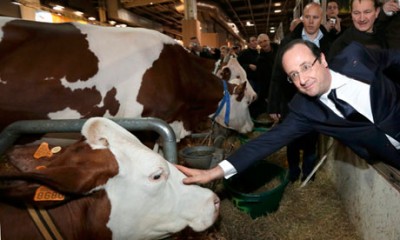Eating Horses in Paris
Cruelties of Factory Farms, Pesticides and Toxic Run-offs in the Food and Water Consumed by Livestock

In 1951, only five years after World War II ended, I managed to make my way to Paris where I landed a job as a courier diplomatique (messenger boy) for the United Nations Sixth General Assembly. Despite the years of war and deprivation, Paris still was a special place with its history, its cafes, galleries, bridges, ornate edifices, and narrow winding cobblestone streets, some seemingly as old as the city itself.
Recent reports about how horse meat has been smuggled into certain meat products in England, Sweden, and elsewhere remind me of one of Paris’s unusual features of 1951: the numerous butcher shops that sold horse meat. Such a shop usually sported a mounted life-sized horse head (made of metal or wood) above the store entrance to advertise unequivocally that the butcher specialized in the sale of horse flesh.
I ate horse meat at a small neighborhood Parisian restaurant a number of times. It was smoothly textured and more gamy than beef. I wasn’t particularly fond of it but it did have the virtue of being affordable. In those post-war days, low-income Parisians were more inclined to eat horses than ride them.
All the talk today about how undesirable it is to consume horses carries the implication that our immense ingestion of other livestock is perfectly acceptable. We are advised not to eat horses, nor dogs, rabbits, or cats—no matter how close to starvation we might be. But devouring limitless numbers of cattle, pigs, sheep, lambs, chickens, turkeys, and ducks is quite all right.
This causes us to overlook the real problem, which is not horse meat but meat consumption in general. The world cannot feed itself if it continues to make meat a common staple. Millions upon millions of livestock require vast amounts of grain and water, ultimately far more than the environment will be able to provide.
Aside from the survival problems raised by the consumption of immense quantities of land, water, and grain in producing meat, there is another menacing aspect: all the poisons and torture that happen along the way from the feedlot to the supermarket. For the health of the planet and for our own health and for the sake of the livestock, we should stop eating animals. Rather than calling for more regulation of meat production, we need to move entirely away from meat meals.
Originating from the top of the food chain, all animal products menace our health. Pesticides and other toxic run-offs work their way into the food and water consumed by livestock. So with wild and farmed fish, and seafood. Finally, perched at the highest rung of the food chain, we humans feast on the accumulated toxins that concentrate further in our bodies.
Many of us are unsettled about eating horses, dogs, cats, rabbits, snakes, monkeys, rodents, or alligators—which other people around the world do eat. Perhaps we should give more attention to the horrid mistreatment of domesticated livestock, the mass produced cruelties of factory farms, the torturous stalls, the joyless overcrowded feedlots, the loads of antibiotic and hormone additives, the frequent sickness and fatal dismemberments, and the terrible toxic accumulations.
Save your health and your planet. May all animal consumption go the way of the Paris horse meat butcher shops.
Michael Parenti‘s recent books include The Face of Imperialism and the forthcoming Waiting for Yesterday: Pages from a Street Kid’s Life (a memoir of his early life).

